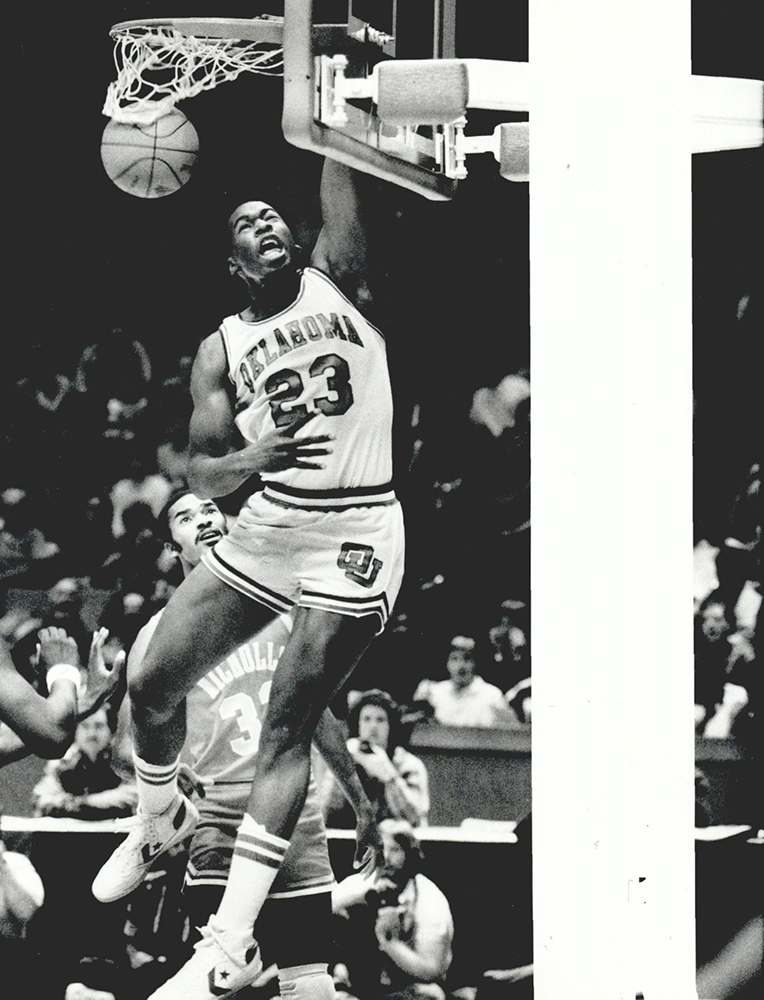
The Encyclopedia of Oklahoma History and Culture
TISDALE, WAYMAN (1964–2009).
Wayman Tisdale, born June 9, 1964, in Tulsa and a graduate of Tulsa Washington High School, dominated college basketball for three seasons as a University of Oklahoma Sooner. The son of Rev. Louis Tisdale, a Tulsa-area preacher, Wayman Tisdale also became an accomplished jazz music bassist and played twelve seasons in the National Basketball Association (NBA). A member of one of Oklahoma's greatest high school basketball classes, 1982, which also included Mark Price, Steve Hale, and Anthony Bowie, Tisdale electrified the university's Lloyd Noble Center with his left-handed jump shot and his ever-present smile. He was the first collegiate player to earn first team All-American honors in his first three years. He averaged more than twenty-four points per game over his Oklahoma career and scored a Sooner-record sixty-one points in a game versus the University of Texas-San Antonio in 1983. After his junior year Tisdale left college as the school's career leader in points (2,661), rebounds (1,048) field goals (1,077), field-goal percentage (.578), free throws (507), and free-throw attempts (767). He departed holding seventeen Oklahoma records and nine Big Eight Conference records. The University of Oklahoma retired Tisdale's number (23) in 1997, making him the school's first athlete, in any sport, to receive this honor.
In 1984 Tisdale played for the Bobby Knight–coached U.S. Olympic basketball team that won a gold medal in Los Angeles. In 1985 the Indiana Pacers selected Tisdale second, behind Patrick Ewing, in the NBA draft. Although he played on poor teams, none with a winning record in his first nine years, he had statistically solid seasons. In 1989 the Pacers traded Tisdale to the Sacramento Kings, and he averaged 22.3 points per game his first Kings season. The following year he injured a tendon and played in only thirty-three games. In 1994 he signed as a free agent with the Phoenix Suns and played on a winning team for the first time. Tisdale recorded a career scoring average of 15.3 points a game.
Finishing his career with Suns, he retired in 1998 to focus on a career in music. He retired on the same day his jazz album, Decisions, went on sale. He had previously released two other jazz albums, Power Forward and In the Zone, with his band, The Fifth Quarter. In 1988 former first lady Nancy Reagan honored him for his work against youth drug and alcohol abuse. He began a company, Big Time Sports Apparel, which specialized in practice gear and sports clothing. At the end of the twentieth century Tisdale and his wife, Regina, lived in Tulsa with their four children. He died there on May 14, 2009.
See Also
ALVAN LEIGH ADAMS, BASKETBALL, DONALD LEE HASKINS, MARQUES HAYNES, ROBERT ALBERT KURLAND, WILLIAM MARK PRICE, SPORTS, BERTHA FRANK TEAGUE






